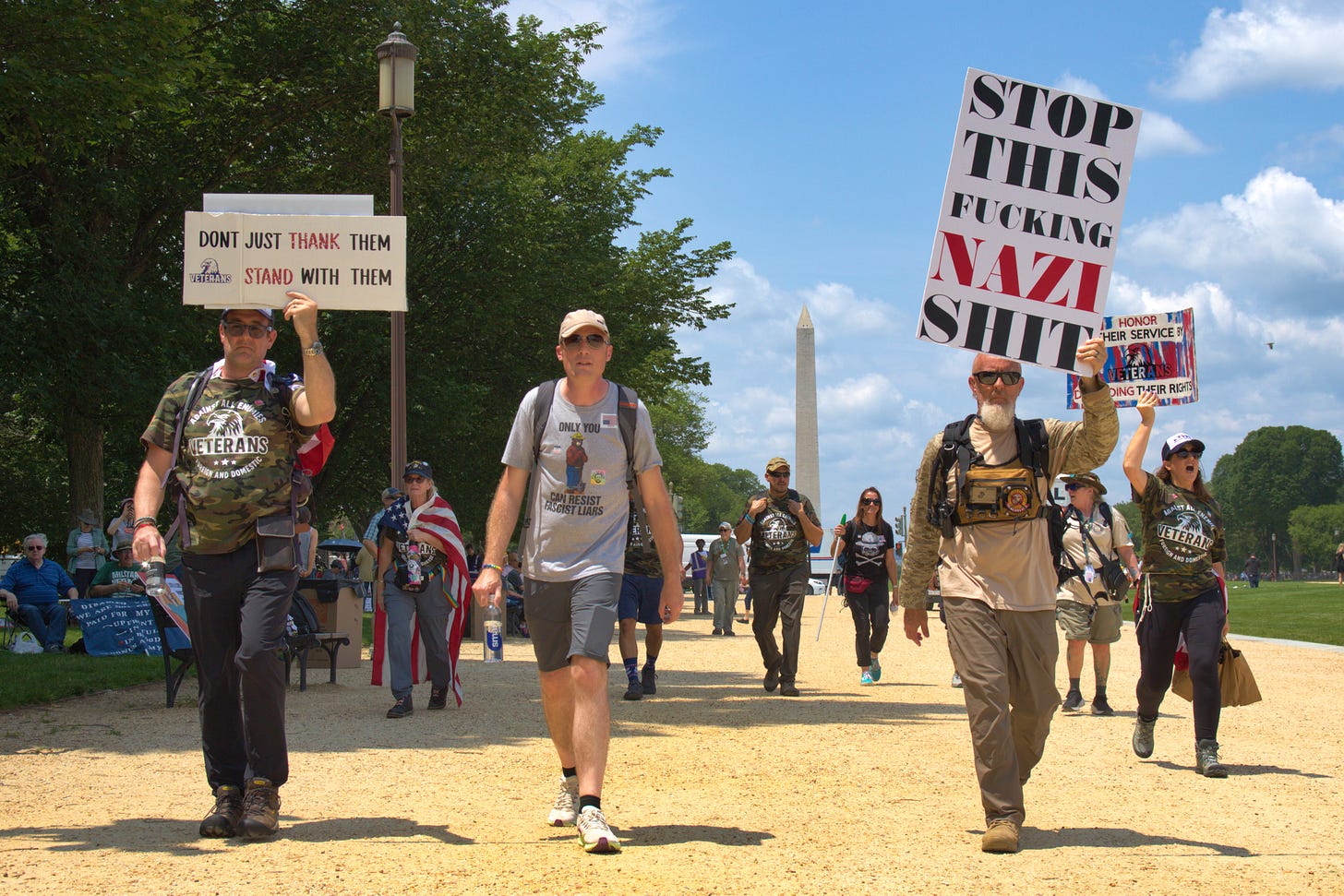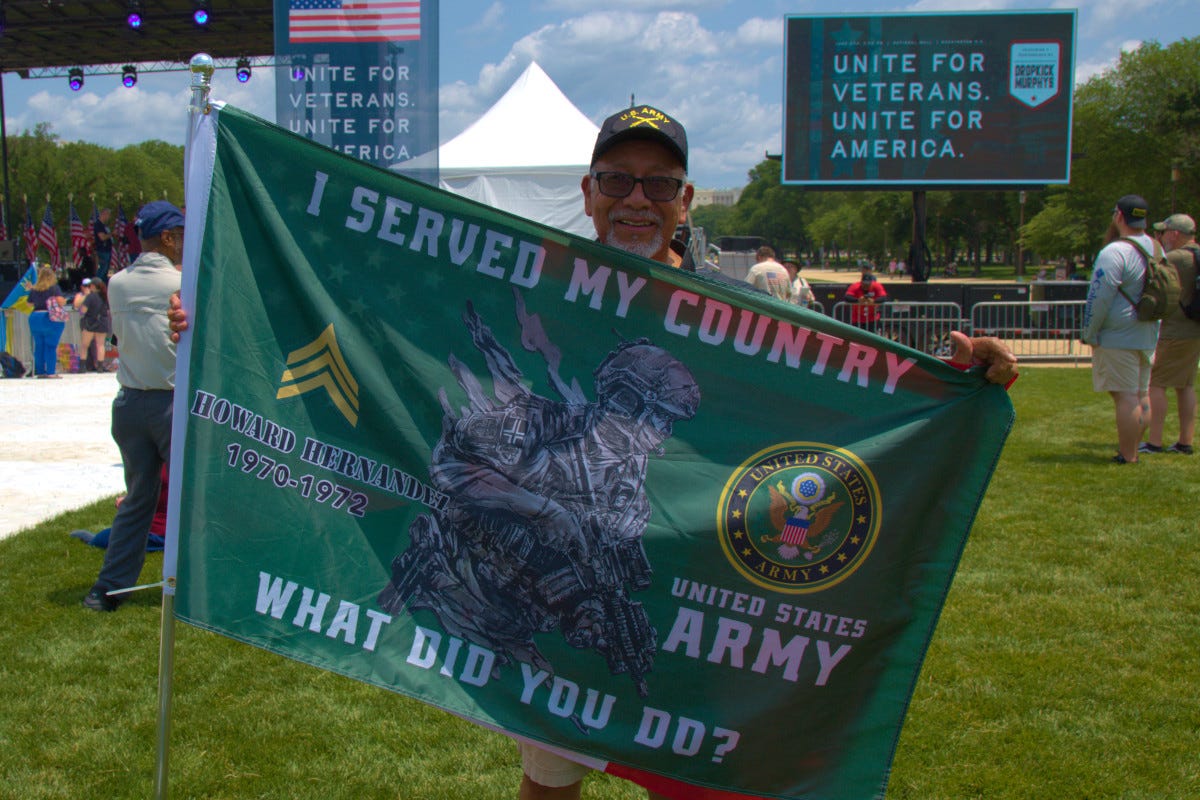If you're not supporting Vets then you're wrong.
They've done their jobs. It's time to stand with them.

The day was hot. It was humid. By the time I arrived at the National Mall I could already feel myself on the verge of sunburn. Not even my natural penchant for melanin production could stave off the searing mid-day sun. The Unite 4 Vets rally hadn’t even yet begun and the day was already brutal. Under the volunteer tents pallets of Deer Park were lined up, with multiple ice tubs already loaded with bottles. One would expect no less from a veteran organized event. Whatever the conditions, there was only one thing for me to do—drink water, charlie mike.
Eighty-one years ago, US forces commenced Operation Overlord by sending over 150,000 men to cross the English Channel and invade the beaches of Normandy, as part of the liberation of France from the Nazis. Now, on the anniversary of D-Day veterans were facing a very different kind of adversary: the apathy of their own government.
Unity would prove to be abundant, as one would expect from a group where veterans were many. Complete strangers made friends within minutes, upon the discovering a surprise connection through their otherwise separate terms of service. Hugs were exchanged, spousal introductions quickly followed.
The atmosphere was one part reunion, two parts mission briefing. For the most part, those arriving seemed to have few questions and fell into their formations as if they’d done it countless times before. With a 1400 scheduled start, hundreds were already on hand by 1330. If you’re not early, you’re late.
It’s tragic that veterans are so well practiced having to go out of their way to demand the treatment they deserve. Most people would use the word “benefits,” but that tends to sound something like “perks” to most people. Nothing could be further from the truth. Veterans “benefits” aren’t a question of privileges. When people put on the uniform to serve the nation in the armed forces, the country quite literally demands that service member’s life be forfeitable. In order to facilitate a person’s ability to serve, certain guarantees have to be made. Often they are called “benefits” but what it really means is support.
If you are injured serving the country, the country will provide healthcare. If you die in service to your country, the country will take care of your dependents in your stead. Because you are uprooting your own life in order to serve, the country will provide support so that you can resettle your life afterward—the G.I. bill will give you an education, V.A. loans will enable you to buy a house, the government will give you special consideration to fill civilian job openings, so on and so forth.
These aren’t privileges. They’re commitments that made service possible in the first place. Yet for some reason, veterans have been forced to take action time and again to demand the government fulfill its end of the bargain.

Among the earliest arrivals was Howard Hernandez. After serving in Vietnam Howard, a Mexican American, eventually became active in the California chapter of the American GI Forum (AGIF) and served as its Commander. AGIF was launched to support the civil rights of Hispanic veterans (who were often excluded from other veteran groups), initially coalescing around the Longoria affair. As Commander of the California Chapter Howard helped guide hundreds of young veterans through attaining their education.
The man’s a damn hero, both in uniform and out.
Underscoring the silent ears in Congress on the veterans issues, only one sitting elected official was scheduled for participation: Senator Tammy Duckworth. Sen. Duckworth served as a Blackhawk pilot in the US Army Reserves and deployed to Iraq in 2004. That November, her Blackhawk was shot down by an RPG. Then Capt. Duckworth lost both her legs and partial loss of the use of her right arm, among her many injuries.
She told a story of being in the hospital in the aftermath of her Blackhawk being downed, and taking responsibility (as the second highest ranking officer in the ward) to ensure the needs of the other injured soldiers were being met. One of her victories of the time was securing the repair of an elevator needed for patients who couldn’t use the stairs. “We were in wheelchairs and they wanted us to show up to 0700 formation.” She decided in the hospital her next form of service would be in government, to advocate for veterans.
The woman is a damn hero, both in and out of uniform.
Known as the “The Gulf War Advocate” I had previously encountered Tim Hauser from his involvement with Burn Pits 360 to get the PACT Act passed. An Airforce veteran, Hauser has battled lung problems for years, as evidenced by his use of a nasal cannula delivering oxygen. But he wasn’t going to let a little thing like respiration stop him from giving his message. He pointed out that legislation currently before Congress would defund the PACT Act, reneging on the promise to fulfill the promise originally reneged on by Congress. “I will always fight for you!” Hauser declared to the audience. That, at least, is one promise they can rely on, because Hauser has been fulfilling it for years, without fail.
The man is a damn hero, both in uniform and out.
Among those attendees was Army veteran Bridgette Meeks of Kentucky. Bridgette first enlisted in the Regular Army as a combat medic. After spending time stationed at Ft. Sam Houston in San Antonio, she deployed to Poland, where she served her country in an often overlooked capacity.
Much of Bridgette’s time in Poland was spent providing community health. She administered vaccines to communities who didn’t otherwise have access, along with performing check-ups and providing basic healthcare for young children. Bridgette spoke effusively about her joy from providing such high impact direct care. As she fondly recalled the look on children’s faces at seeing her and her colleagues, I couldn’t help but be grateful for the good will engendered for our country by such actions. What Bridgette described was a prime example of how America is able to exert some of our most powerful influence around the world. It wasn’t lethality, but it made America stronger.
After her initial enlistment period came to an end Bridgette went home to join the National Guard. In civilian life she became a nurse with a dedication to her patients that goes above and beyond. Military service teaches a person how to have the courage to do the right thing. Among the ways she’s put that into action in her civilian life, Bridgette told me that she had been forced to make a hard decision to report a colleague for patient abuse. “It’s hard to have to report someone you work with, but the patient is most important.”
I will always place the mission first.
After eight years in the Guard, Bridgette found herself with a difficult choice. Soldiers don’t have the privilege of political beliefs. They serve regardless of whichever way the winds are blowing at a given moment, and they go where they’re told. But when it came time for Bridgette to consider re-upping again, she found herself struggling to look herself in the mirror, as she grappled with the prospect of Donald Trump once again being her Commander-in-Chief. The January 6 attack especially weighed heavily on her heart, sickening her to see what the Commander-in-Chief had caused. “We have these historic institutions for a reason.”
Bridgette would not re-up, and is now a full time civilian. Aside from continuing her civilian nursing career she’s developed a social media following where she engages people from disparate parts of the political spectrum to form constructive discourse, with the goal of neutralizing the kind of toxic polarization that has become so prevalent in our country. Her goal isn’t to create political converts, it’s to foster civil tolerance and a re-dedication to the civic process. It’s exactly the kind of small acts with great kindness approach you would expect from a nurse.
The woman is a damn hero, both in uniform and out.
Veterans shouldn’t have to fight their own government for the support they deserve. Not only have they served their country in the first place, but their very spirit of service often leads to serving their communities in new ways after they take off the uniform. And let’s be honest, can we really expect this group to simply go away quietly? They will never accept defeat, they will never quit. Eventually the nation will have to come through. Until then, veterans will drink water and charlie mike.




